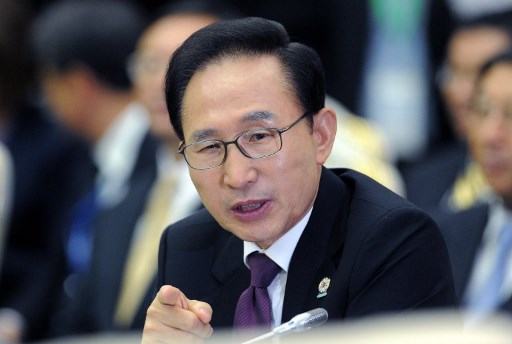
SEOUL, South Korea (AFP) — Former South Korean president Lee Myung-bak has admitted receiving $100,000 from the state spy agency while still in office, reports said Thursday after he faced a marathon interrogation by prosecutors over corruption allegations.
Lee returned home Thursday after lengthy questioning as he became the last of the country’s living ex-leaders to be embroiled in a criminal inquiry.
He denied most corruption charges but admitted taking the off-book funds from the National Intelligence Service (NIS) via a presidential aide, Yonhap news agency said Thursday, citing a prosecution official.
Allegations of graft involving the conservative 76-year-old’s relatives and aides during his term have mounted in recent weeks as prosecutors investigate multiple cases of bribery amounting to millions of dollars.
The probe means that all four living former South Korean presidents have been convicted, charged, or investigated for criminal offenses.
Lee spent more than 21 hours at the prosecutors’ office in Seoul from Wednesday morning and did not reply to questions from journalists outside as he left.
“President Lee denied most of the charges,” the prosecutor was quoted as saying by Yonhap news agency.
“But he accepted some facts. For example, he acknowledges the fact that he received $100,000 (106 million won) of the (1.7 billion won of a secret) funds” Lee allegedly pocketed from the NIS, the prosecutor told Yonhap.
The news agency added that Lee refused to explain what he did with the $100,000. He denies receiving the rest of the money.
A prosecution official contacted by AFP declined to comment on the report.
‘Political revenge’
One of Lee’s former aides Kim Hee-joong has told the Hankook Ilbo daily that he himself delivered the $100,000 to Lee’s wife in 2011 when Lee visited the United States.
Lee, who was head of state from 2008 to 2013, has previously denounced the inquiry as “political revenge” and said Wednesday he hoped it would be the “last time in history” that a South Korean ex-leader was summoned for questioning by prosecutors.
“As a former president, I have a lot to say about this but I will spare my words,” he told reporters when he arrived for the interrogation.
Prosecutors are thought likely to ask a court for an arrest warrant for Lee in the coming days.
The allegations against Lee include claims that the Samsung Group bought a presidential pardon in 2009 for its chairman Lee Kun-hee, who had been convicted of tax evasion and given a suspended jail sentence.
Both Samsung and Lee have denied the allegations as groundless.
According to reports, Lee is also accused of accepting 2.2 billion won from a former CEO of a state-financed banking group for helping him assume the post.
In addition to allegedly pocketing 1.7 billion won from the NIS, he is accused of receiving 400 million won in bribes from a lawmaker and embezzling millions of dollars from DAS, an auto parts company he is said to own under the names of his relatives.
Lee denied owning DAS under questioning Wednesday, the prosecution official told Yonhap.
South Korean presidents have a tendency to end up in prison — or meet untimely ends — after their time in power, usually, once their political rivals have moved into the presidential Blue House.
Conservative Park Geun-hye was ousted last year over a massive corruption scandal that emerged in 2016, and the verdict in her bribery and abuse of power trial is due next month, with prosecutors demanding 30 years in jail.
Lee’s own predecessor, the liberal Roh Moo-hyun, committed suicide by jumping off a cliff after being questioned over corruption allegations in 2009.
After the South embraced democracy in the 1990s former dictator Chun Doo-hwan and his friend and successor Roh Tae-woo were handed sentences of death and life imprisonment respectively for their involvement in a 1979 military coup and for receiving hundreds of millions of dollars in bribes from businesses.
Both their sentences were reduced on appeal, and they were eventually pardoned and released after serving about two years each.
© Agence France-Press







